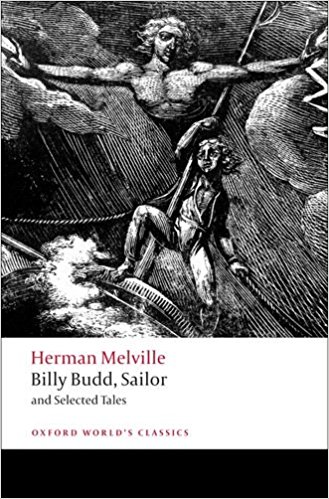Ramy Gadalla
Professor Alok Yadav
ENGH 305-002
Displaying Power – through Good or through Evil?
In Herman Melville’s Billy Budd, Sailor the main character Billy Budd represents Adam . Initially, in 1792, Billy works on the merchant ship Rights-of-Man. Then he gets transferred to serve under the King’s crew in the warship Bellipotent. He is introduced to the master-at-arms John Claggart against whose envious personality he receives warnings from Dansker and his shipmates. But he does not listen because of his simple nature. Rather, he loves Claggart and is eager to carry out his orders with cheerfulness. At last, when Billy hears Claggart’s false accusations against him, he stutters, does not hold his temper, and fleetingly [impulsively?] hits and [accidentally] kills Claggart. Consequently, Billy condemns himself to death as a mutineer. In his novel, Billy Budd, Sailor, Herman Melville highlights how anger is a “titanic force dwarfing man,” because it causes Budd to lose his innocent traits and receive the death sentence (Milder xxv); his high temper and anger put him at a disadvantage when compared with biblical references or narrative-based characters; the author is used to expose negative forces in the society and pose solutions to them in his novels; anger caused a similar catastrophe in the fleet where Melville’s cousin worked as a lieutenant; and also because during the court trail the authority do not show empathy with Billy, but rather condemn him persistently for his anger. This paper will first describe Billy’s innocent traits and show how all of them get breached when thoughts culminate in his mind. Secondly, it will analyze comparisons made between Billy and biblical characters as well as the character of Captain Vere, showing how Billy falls short in each comparison, owing to his anger. Thirdly, it will analyze four conclusions from secondary sources, showing how these analyses condemn Billy for his anger.
Initially, that is, before he loses his inner peace to hit Claggart, Billy is described as being like Adam before the fall (Melville 36, 53, and 10-11) because of possessing he possesses four traits: He is obedient, straightforward, modest, and does not compare himself to others. Billy’s obedience manifests when he cheerfully obeys Lieutenant Ratcliff at the time the lieutenant shouts at him to enter the Bellipotent (8). Also, Billy’s straightforwardness manifests when he bodes the Rights-of-Man ship farewell, not meaning to “satire on it or on impressment in general” (8). With this, the narrator emphasizes that Billy never deals in double meanings, that is, when he says he cherishes the Rights-of-Man he means that and never intends to ‘satire on it.’ Furthermore, Billy is characterized with modesty when the crewmembers and leaders on board of both the Rights-of-Man and Billipotent ships admire him, yet owing to his “moral nature” he remains “unaffected,” that is, never feels superior than his shipmates (4). Moreover, Billy does not compare himself to others because when he transfers to the Bellipotent he does not get “abashed by the larger and more knowing world of the ship” (10); with this, the narrator emphasizes that Billy lacks any “conceit or vanity in his composition” (10). Claggart is envious of Billy’s innocent traits. For example, Dansker tells him, “’Jimmy Legs’ [Master- at-arms] is down on you” (44). At the moment he hears Claggart’s accusations of mutiny, he fears that this could lead to his death. Even though Captain Vere speaks to him in a fatherly tone, these thoughts culminate in his mind and he loses his inner peace. Consequentially, Billy disrespects the law, acts cunningly, feels conceited, and compares himself to Claggart—taking revenge and killing him. Showing how Billy loses all his innocent traits—obedience, straightforwardness, and modesty—at the moment he loses his inner peace and hits Claggart, Melville indicates that anger is a universal force that needs to be curbed.
Not only does the total loss of Billy’s innocent traits at the moment he hits Claggart point out that anger is the universal sin the author is exposing, but also the narrator’s explicit remarks point out that anger. The narrator mentions that there is “but an occasional liability” that has the potential of breaking Budd’s inner peace: He can be disturbed by a “sudden provocation of strong heart-feeling” (13). The narrator puts emphasis on Billy’s stutter, which emanates from his anger, as the sole source of liability that can break his inner peace, causing a strong heart feeling; this shows that anger and the loss of inner peace are major themes concerning the author. Furthermore, the narrator attributes Budd’s will, which never “[inclines to] malice” to his lack of experience to “the reactionary bite of that serpent” (37). This refers to how Billy never experiences anger and as a result never wills malice; if he experiences anger he is going to will malice. By attributing Billy’s innocent traits to the lack of anger, the narrator highlights that anger is the “titanic sin” that has the potential of excluding Budd as lust and disobedience did with Adam.
Melville was contemplating on theology before writing Billy Budd, Sailor (Parker 26). Several of the comparisons between Billy and biblical characters hold impact on the narrative’s import. For example, he associates Billy’s innocent traits “to the time before Cain’s city” (Melville 403). This underscores the similar roots of both Cain and Billy’s sins—both kill because of angry emotions.
Another biblical reference is comparing between the trial of Billy and that of Jesus (56-58; ch. 19). In their trials, both receive false accusations but are reinforced by the greatest authority in their time. During the trial of Jesus, Pontius Pilate wants Jesus to reply to the charges, asking “Don’t you hear the testimony they are bringing against you?” (New International Version, Matt. 27.13). Likewise, during Billy’s trial Captain Vere shouts at him, “Speak! Defend yourself” (Melville 56). However, Jesus maintains obedience both to the law by respecting everyone and to his Father by carrying on with his goal, which is to be nailed to the cross (Phil. 2.8). He also maintains his straightforwardness because of telling Pilate that his “kingdom is not from this world” (John 18.36). Jesus’s modesty manifests itself when he does not get abashed by the false accusations, but rather questions the servant who hit him, saying, “If I spoke the truth, why did you strike me?” (John 18.23). Whereas Budd responds with anger Jesus contains himself. Their ultimate ends also highlight which attitude is preferred; whereas Billy loses his innocent traits and gets hanged, Jesus rises up from the dead (1 Cor. 15.12). This emphasizes that the loss of inner peace is the universal force the narrator is condemning.
Another comparison in the narrative is found between Captain Vere and Billy. The author spends the sixth and seventh chapters just outlining the former’s character. He showcases Vere’s obedience in performing all tasks demanded by his superiors (Melville 19-22). He shows also his straightforwardness in directly and unambiguously answering the officers of lesser rank (19-22). Moreover, he shows his modesty when walking in public or on board of the ship while not being puffed-up in attitude (19-22). However, the major difference between Captain Vere and Billy is that Vere, is “not injudicious” while being “intrepid to the verge of temerity” (19). On the other hand, Billy’s intrepidness can cause anger and lead him to commit whimsy mistakes (57). The similarity between Vere and Billy, with exception to anger, highlights that the accumulation of events in one’s mind and loss of inner peace are the likely themes the narrator is pointing at.
So far, this paper has shown three comparisons between Billy and each of Cain, Jesus and Captain Vere. The fourth comparison, made between Captain Vere and Nelson, also highlights the negative consequences of Billy’s anger. Nelson sat at the brink of the Trafalgar fight to write his will and the narrator describes this as indicating Nelson’s “vainglory” (17; ch. 4). Vere, also, because Billy became angry and committed his impulsive crime of killing Claggart, condemns him to death before any “review or appeal by higher authority” (Ledbetter 616); he also feeds his ego by enforcing his view to kill Billy after the court assembles: with his voice showing arrogance, he says that “as the King’s officers,” their loyalty and adherence should be to the “imperial conscience” maintained by the “martial law” and not yield to the “private conscience [knowing that Billy is innocent from the charges of conspiracy Claggart set against him]” (Melville 67-68). Vere feels guilty because he is sending Billy to death while he could save him. Nelson fed his vainglory by writing his will at the brink of the Trafalgar; likewise, Vere turns to feed his own ego over Billy by winning him over and “personally communicat[ing] the findings of the court” to him (17 and 71; compare ch.s 4 and 22). Billy’s anger not only made his accusers able to condemn him to death, but also feed their own ego over him. There are many occasions when the person will be proved innocent if he/she contains him or herself, not necessarily react to defend him or herself. The example of Cain, for instance, shows that. Had Cain been able to contain his temper, he would have been able, eventually, to learn how to offer sacrifice and would please God. The same applies to Billy, and he would not be listening to people’s contempt or their feeding of their ego over him.
The law practitioner and Naval Reserve Lawyers Association’s President Jack Ledbetter asserts that Billy’s trial is appropriately conducted by the naval law’s standards because Billy trespassed on an officer of a higher rank (616). Such a testimony and Vere’s impulsive decision to condemn Billy reinforce the image of “Claggart… as an innocent patriot [while] Billy [as a] condemned [and] depraved mutineer” (Ledbetter 619; Parker 36). This indicates that the author is removing all sympathy towards Billy Budd to truly condemn him for losing the inner peace and subsequently killing Claggart.
On the other hand, a substantial number of scholars take Billy’s statement, “God bless Captain Vere,” which he makes before being hanged as a statement of acceptance to the sentence of death (Sedgwick 162). From the instant Billy makes this statement, the author gives him back his dignity. The narrator describes Billy’s hanging thereafter as majestic and manly, not showing any muscle twitches (Milder 80). This exemplifies that love, which is opposite of anger, is the most praiseworthy. Billy regains his dignity at the last moment because he accepts to love Vere, his accuser.
So far, using the narrative’s form and content, the universal titanic force has been marked as the loss of inner peace. An example of a non-structural thematic feature is the comparison between Billy and each of Cain and Jesus. An example of a structural thematic feature is the contrast between Billy’s innocent traits at the beginning of the narrative compared with the end; before he hits Claggart he loses his innocent traits, but after he says “God bless Captain Vere” he regains them. This is also taken as an example of a structural formal feature because the author spends substantial amount of the text describing the traits that define Billy’s innocence. An example of a non-structural formal feature is the illustration that two chapters are spent describing Captain Vere’s character; making Vere’s character similar to Billy with exception to the anger that can drive Billy to act injudiciously, indicates that anger is the universal force. Also, Melville’s background shows that the theme of anger was on his mind while writing the novel. Melville was contemporary to the Somers incident where his cousin served, and also he wrote on it three articles while writing Billy Budd’s narrative (Parker 73). The same incentive that caused the man-of-wars men to conspire against the ship during the Somers incident, that is, the culmination of events in their minds and anger, also causes Budd to hit Claggart. The common theme of anger in both instances highlights that it was also on the author’s mind while writing his novel and that it is a universal sin that he is addressing.
Characterization of Melville’s thought process also proves that Billy’s sin is the culmination of events in his mind and loss of inner peace. In Milder’s Introduction of Billy Budd, Sailor, and Selected Tales, Milder argues that Melville is interested in “universal, uncontrollable titanic forces that seem to dwarf man altogether” (Milder xxv). Milder adds that Melville poses “social, personal and cosmic” solutions to conducting oneself in the face of “suffering” (Milder x). The act of culmination of events in one’s mind leading to the successive loss of inner peace is a universal, uncontrollable titanic force in its effect; Melville intends to expose it in his novel and to pose “social, personal and cosmic” solutions to conducting oneself in facing them. He highlights its negative impact on Billy’s fate; then in the statement, “God bless captain Vere,” he emphasizes that the solution is reconciliation with the foe from the beginning altogether.
Works Cited
Ledbetter, Jack, W.. “The Trial of Billy Budd, Foretopman.” American Bar Association Journal 58.6 (June 1972): 614-619. JSTOR. Web. 1 May 2015.
Melville, Herman. Billy Budd by Herman Melville. Ed. Jim Manis. Eng. Dept. of The Pennsylvania State U, 2011. Web. 30 Sep. 2015. Retrieved from < http://mseffie.com/assignments/billy_budd/Billy%20Budd%20Text.pdf>
Milder, Robert, ed. Billy Budd, Sailor and Selected Tales. Cary, NC: Oxford UP, 2009. Print.
New International Version. [Colorado Springs]: Biblica, 2011. BibleGateway.com. Web. 5 Aug. 2015.
Parker, Hershel. Reading Billy Budd. Evanston, IL: Northwest UP, 1990. Print
Sedgwick, William Ellery. “Billy Budd is a Tale of Acceptance.” Readings on Herman Melville. Ed. Szumski, Bonnie. San Diego, CA: Greenhaven Press, 1997. Print.
See marginal comments along the way. The use of secondary sources is not well integrated into your analysis and discussion, but rather functions as a discrete add on at the end of the essay. I’ve highlighted in yellow places where your writing needs revision or correction. (The extended passage that is underlined at the top of page 6 should not be underlined.)





